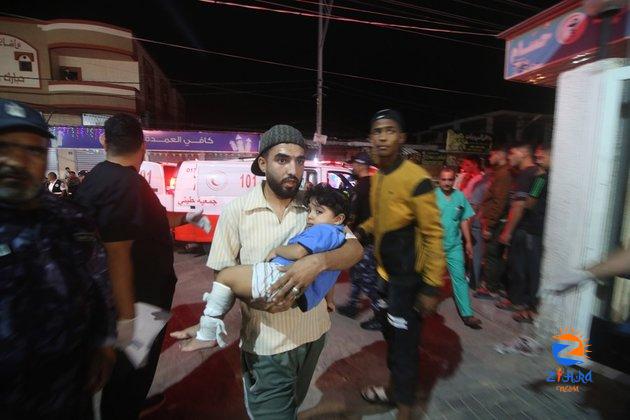
[ad_1]

The Palestinian-Israeli conflict has displayed no indications of easing over the years, and the current clash is unlikely to end soon as both sides are preparing for the worst scenario.
GAZA/JERUSALEM, Oct. 9 (Xinhua) — The conflict between Israelis and Palestinians escalated drastically Saturday after Hamas fired thousands of rockets into Israel in a big surprise attack, which was responded by Israel with massive airstrikes and punitive measures.
Israel’s cabinet declared a “state of war” on Sunday. More than 800 Israelis have been killed so far, the country’s worst losses since the 1973 Arab-Israeli war, according to the Israel Defense Forces on Monday.
The Gaza-based Health Ministry’s latest update on Sunday said the death toll from Israeli airstrikes in Gaza has risen to 493, with more than 2,700 others injured.
UN Security Council and many other countries expressed deep concern over the continuation of the current escalation and the ensuing severe deterioration of the security and humanitarian conditions.
SURPRISE ATTACK
On Saturday morning, Palestinian militants showered Israel with thousands of rockets, and dozens of militants infiltrated southern Israel, igniting the conflict between Israel and Hamas, which marks the most severe conflict between the two sides since May 2021.
In response to the attack, the Israeli military launched the operation “Swords of Iron,” carrying out dozens of airstrikes against Hamas targets in the Gaza Strip.

“They’ve been planning this for a long time,” said former Israeli National Security Advisor Eyal Hulata. “Obviously this is a very coordinated attack, and unfortunately they were able to surprise us tactically and cause devastating damage.”
Hamas military commander Mohammad Deif said the attack was in response to Israel’s blockade of Gaza, its frequent raids on the West Bank over the past year, its storming of the Al-Aqsa Mosque compound — a site holy to both Muslims and Jews — Israeli settler attacks on Palestinians and the expansion of Israeli settlements.
The attack came on Simchat Torah, a Jewish holiday that marks the conclusion of the annual cycle of public Torah readings, and almost coincided with the 50th anniversary of the Yom Kippur War, which began on Oct. 6, 1973, between Israel and a coalition of Arab states led by Egypt and Syria.
Some Arab and Israeli media analyzed the choice of Hamas to raid on Saturday, after thorough preparations, as “symbolic” and as a way to elevate its status in the Arab world.
According to Eyal Pinko, a senior researcher at Israel’s Begin-Sadat Center for Strategic Studies, the recent attack occurred amid the Israeli holiday season, a time when Israel’s vigilance tends to decrease.
BLASTING FUSE
The Palestinian-Israeli conflict has displayed no indications of easing over the years. Direct peace negotiations between the two parties came to a standstill in 2014 due to disputes over Israeli settlements and the recognition of a Palestinian state.
Hamas has repeatedly said that it condemned any progress in normalizing relations between Arab countries and Israel, saying that normalizing relations between Arab countries and Israel in all forms is unacceptable and is bound to harm the Palestinian cause.

The latest round of conflicts comes when Israel seeks to normalize its relations with Saudi Arabia. For Israel, normalizing relations with Arab countries has remained an important strategic goal for years as it seeks to improve the geopolitical environment.
So far, six Arab countries have normalized relations with Israel, including Egypt and Jordan, which established diplomatic ties with Israel in the 1970s and 1990s, respectively, as well as the United Arab Emirates, Bahrain, Sudan and Morocco, which agreed to normalize ties with Israel under the Abraham Accords in 2020.
The United States has long positioned itself as a mediator in the Palestinian-Israeli conflict. However, it has consistently shown a bias towards Israel, such as relocating its embassy from Tel Aviv to Jerusalem in 2018 and continuously providing military assistance to Israel.
In a show of support for Israel, U.S. Defense Secretary Lloyd Austin said Sunday that the Pentagon is sending warships and fighter jets to the Eastern Mediterranean region.
Israeli Defense Minister Yoav Gallant has expanded the country’s “special security situation” to the entirety of Israel’s territory.
Saleh al-Arouri, deputy chief of Hamas, told Al Jazeera Arabic that Hamas is ready “for all options, including a war and an escalation on all levels.”
The current clash is unlikely to end anytime soon as both sides are preparing for the worst scenario.
[ad_2]